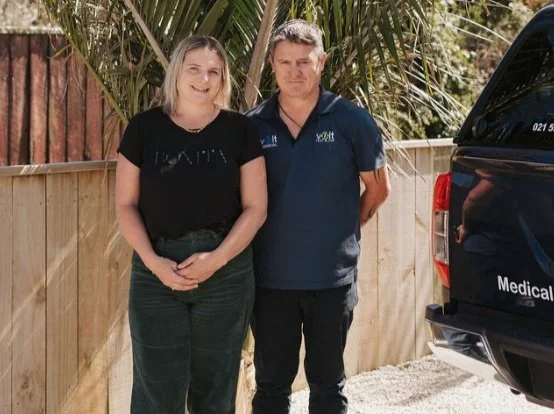
about us
taranaki’s leading electrical test & tag service
Locally owned and operated, our primary goal is to protect and prevent serious harm to people and property throughout Taranaki.
Testing and tagging involve checking all electrical tools, leads, and appliances that plug into a wall socket to ensure safety in businesses, schools, worksites, and more. This process ensures compliance with New Zealand legislation and Australia/New Zealand Standards (AS/NZS). Occupational Health and Safety legislation mandates a ‘duty of care’ to provide a safe workplace.
As a health and safety-focused company, we strive to educate and inform local businesses about these laws and regulations. Our objective is to become the leading organisation in electrical safety throughout Taranaki by offering specialist testing and tagging services. We are dedicated to protecting lives and assets from unnecessary electrical risks.
meet the team
Karla & Colin
Karla and Colin own Volt Test & Tag. Colin works directly with clients, conducting inspections and recommending necessary repairs or maintenance, while Karla manages day-to-day operations and finances behind the scenes. Together, they provide a valuable service, ensuring electrical equipment is up to code and safe for use.
Josh
Meet Josh, a biomedical technician with years of experience in testing and maintaining medical equipment for our clients. Josh is known for his attention to detail and dedication to ensuring that all equipment is in top working condition. We are grateful to have Josh and his valuable skills on the team.
Ethan
Welcome Ethan to the Volt Testing and Tagging team! Ethan is excited to join the team and contribute his expertise to ensuring the safety of our clients' electrical equipment. With his enthusiasm and passion, we know that Ethan will be a valuable addition to our team. We are thrilled to have him on board!
why should I test & tag my electronics?
Simply put — peace of mind.
While testing and tagging is not currently mandatory by law, many businesses and family homes opt to test and tag their electrical items to ensure the safety of those they care about.
Opting out of testing and tagging is considered reckless, as it is nearly impossible to ensure an appliance's safety by visual inspection alone.
electrical regulations
As a health and safety-focused service, we strive to educate and inform local businesses about these laws and regulations. Our main objective is to protect and prevent serious harm to people and property.
Under Electrical Regulation 26, appliances are deemed electrically safe if they have a current test tag issued according to AS/NZS 3760:2010. If an accident occurs with an untagged appliance, WorkSafe NZ (formerly OSH) may prosecute or conduct a full audit. Additionally, insurance companies may deny claims if regulations were not followed at the time of the incident.
Testing and tagging involve checking all electrical tools, leads, and appliances that plug into a wall socket to ensure safety in businesses, schools, worksites, and more, in accordance with New Zealand Legislation and AS/NZS standards. Occupational Health and Safety legislation imposes a duty of care to provide a safe workplace.
For further information or questions regarding these regulations please contact us for an obligation free, no-charge visit to your premises by one of our technicians.
Electrical Standards
We adhere to the AS/NZS 3760:2010 standard for our operations. Additionally, several other regulations and legislation govern the testing and tagging requirements for appliances, including:
Health and Safety in Employment Act 1992
Health and Safety in Employment Regulations 1995
Electricity Act 1992
Electricity (Safety)
Regulations 2010
For your convenience, we have provided a brief overview of each act and regulation.
-
The act applies to all New Zealand workplaces and places duties on employers, the self-employed, employees, principals and others who are in a position to manage or control hazards.
Every employer shall take all practicable steps to ensure the safety of employees while at work and in particular shall ensure that plant is maintained and safe to use.
-
Precautions to be taken with some particular hazards – Guidelines to the regulations.
See section 2.13 Portable electric equipment – where any portable electric, power-driven equipment is provided, the employer should ensure that all such equipment conforms to the requirements of the Electricity Act 1992 and the Electricity (Safety) Regulations 2010. Where a regulation exists, its requirements are mandatory.
-
Section 169 – specifies regulations for electrical safety
-
These regulations require all portable, electrical equipment to be tested and tagged in accordance with AS/NZS 3760.
RCD protection is also encouraged for extra safety. Even with RCD protection, appliances can be dangerous and periodic appliance testing is necessary for safety and legal compliance under OSH (WorkSafe NZ) regulations.
Excerpt from the Electricity (Safety) Regulations 2010:
15 Using works, installations, fittings, appliances, and associated equipment
(1) A person who owns or operates works, installations, fittings, or appliances must not use, and must not allow any other person to use, the works, installations, fittings, or appliances if the works, installations, fittings, or appliances are electrically unsafe.
(2) A person who uses, or supervises the use of, associated equipment must ensure that the associated equipment is not used in a manner that renders the associated equipment a danger to persons or property.
(3) A person who owns or operates works, installations, fittings, or appliances commits a grade A offence if he or she uses, or allows another person to use, the works, installations, fittings, or appliances, knowing that, or being reckless as to whether, the works, installations, fittings, or appliances are electrically unsafe.
-

No Shocks ⚡️ guaranteed
Shock-Free Service: Say goodbye to unpleasant surprises. Our transparent pricing, prompt service, and thorough inspections ensure no shocks — guaranteed.
-

Convenience That'll Keep You 〰️ Current 〰️
Need testing and tagging ASAP? No problem. Our flexible scheduling means we can accommodate your needs, even on short notice.
-

We’re Amped with Expertise 💡
Trust in our expertise to keep your appliances shock-free. Our meticulous testing and tagging process ensure they're always safe and reliable.





